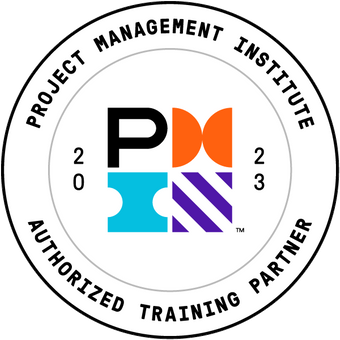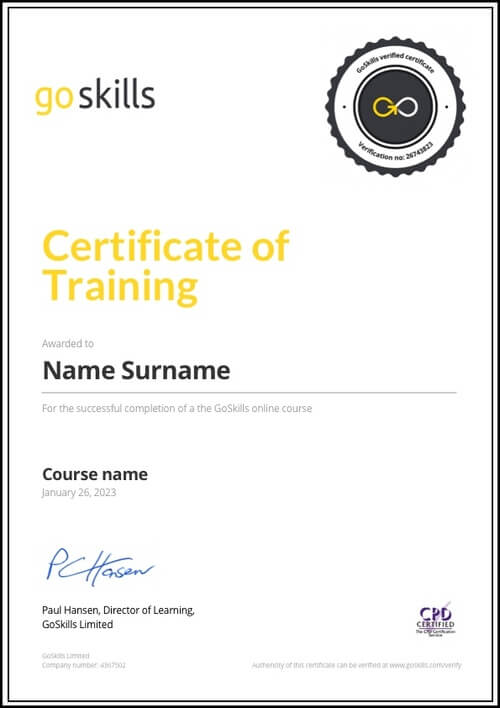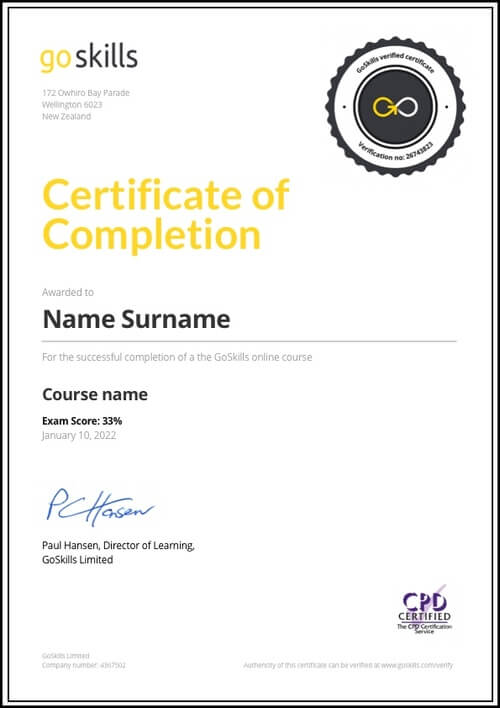Features
Premium video tutorials
Award-winning instructors
Personalized learning
Get certified
Learn at your own pace
Mobile (learn on-the-go)
Unlimited tests and quizzes
Regularly updated content
Overview
The GoSkills CAPM® Certification Training course will prepare you to ace the CAPM exam, whether it is your first time getting certified or you are maintaining your certification.
This CAPM exam prep course covers all process groups and knowledge areas you will be tested on in the CAPM exam. The course is aligned with the PMBOK® Guide—Sixth Edition and is fully up to date with the September 2019 CAPM exam changes, so you can be confident you are learning the most current and relevant information.
By the end of the course, you will have the knowledge and confidence you need to pass the CAPM exam and gain your sought-after certification. Obtaining your certification can help you enhance your career options, boost your salary, and give you the right skills to get better results on your projects.
This course is specifically designed to prepare you for the exam. If you need a refresher on the fundamentals of project management, take our CAPM Foundations course first. Combined with the CAPM Certification Training course, this powerful duo will give you the knowledge required to pass your exam with flying colors.
In this course, you will learn:
- The requirements and steps for the CAPM application process.
- How to schedule your CAPM exam and what is required for a passing score.
- How to become a more knowledgeable and skilled member of a project management team.
- The five project management process groups of initiation, planning, execution, control and closeout; and the processes within each group.
- The ten project management knowledge areas and the relationship of the processes within each area, including scope, cost, quality and resources.
- How best to use the available PMI resources in addition to this course to prepare for your exam.
This course provides 26 project management education hours or PDUs to maintain your certification. GoSkills is a PMI Authorized Training Partner (ATP).
Once enrolled, our friendly support team and tutors are here to help with any course related inquiries.
FAQ
Who is this course for?
This course is ideal for anyone who wants to prepare for the CAPM exam, whether it is your first time getting certified or you are retaking the exam to maintain your certification.
This course is geared specifically to prepare you for the CAPM exam, so if you need a refresher on the basics of project management, try our CAPM Foundations course first. Combined with the CAPM Certification Training course, this powerful duo will prepare you to ace your exam with flying colors.
Does this course provide project management education hours or PDUs?
Yes, the GoSkills CAPM Certification Training course provides 26 project management education hours, or 26 PDUs to maintain your certification. This surpasses the CAPM certification requirements of at least 23 hours of project management education. GoSkills is a PMI Authorized Training Partner (ATP).
Is it worth getting a CAPM certification?
Gaining a CAPM certification can enhance your career options and even boost your salary. Not only will you learn how to better work within a project team and improve your project management skills, CAPM is an industry recognized certification worldwide. As CAPM is suitable for individuals without a lot of project management experience, it’s a great way to get your foot in the door by proving your expertise to employers.
How do I become CAPM certified?
- Meet PMI’s prerequisites for CAPM certification of:
- Secondary degree (high school diploma, associate’s degree or global equivalent)
- 23 hours of project management education completed by the time you sit for the exam (this course provides 26 hours of project management education).
- Study for the CAPM exam.
- Take an online course like GoSkills’ CAPM Certification Training course, complete with exercises and quiz questions to test your knowledge. It is also helpful to review PMI’s CAPM Handbook, and the PMBOK® Guide—Sixth Edition.
- Pay the PMI CAPM exam fee and take the CAPM exam.
- This can be an in-person Center-based exam, or an online proctored exam.
- The exam has 150 questions, and you have three hours to complete it.
- Maintain your certification by retaking the exam every five years.
Is there a work experience requirement for CAPM?
As of August 28, 2019, PMI has removed the work experience requirement. Prior to this change, PMI required 1500 hours of work experience to qualify.
How much does a CAPM make?
Your CAPM certification can help you demonstrate your expertise and value to employers, and boost your salary. Project managers who hold a CAPM certification can earn more than their non-certified colleagues. According to recent PayScale data, the average salary for a CAPM certification holder in the United States is $66,000. As CAPM is an entry-level certification, the more practical experience you gain will help set you up for more lucrative positions.
Which certification is better, CAPM or PMP?
It is not necessarily about which certification is better, but rather which is more suitable for you at this stage of your career.
The PMP certification is suitable for more experienced project managers who already have 3-5 years of experience leading projects, a secondary degree or four-year degree (this varies depending on your years of project management experience), and 35 hours of project management education.
If you meet these requirements, we would recommend you go for the PMP certification, and prep for the exam with the GoSkills PMP® Certification Training course. As the prerequisites are more advanced, the exam topics are more in-depth than for CAPM.
The CAPM certification is ideal for individuals without a lot of project management experience wanting to kickstart their careers and showcase their knowledge to potential employers. If you are new to project management or you do not yet have the necessary work experience, CAPM is a better choice to build up your credentials.
Once you have obtained your CAPM certification, you can gain more project management experience and take the PMP exam at a later date if you choose to.
Is GoSkills a PMI ATP?
GoSkills is a member of the PMI ATP Program. To earn the PMI Authorized Training Partner designation, a provider must meet rigorous standards for quality and effectiveness. By training with GoSkills, you can be confident that your course content and instructors meet the highest quality standards.
Do you have other online project management courses?
GoSkills offers a range of project management courses online. All of our project management courses allow you to earn contact hours and PDUs to put towards certification with PMI.
Can I train my team with GoSkills?
Absolutely. We work with many businesses, big and small, to train and upskill their staff. Get started here or contact us with your requirements.
Summary
Syllabus
CAPM® and the PMBOK® Free Lesson
1
CAPM® Credential
The CAPM® is a credential for those entering the project management field or participating on project teams. It demonstrates knowledge of the foundations of project management.
2
CAPM® Application
3
CAPM® Examination
4
PMI® Code of Conduct
The PMI® Code of Ethics and Professional Conduct sets a standard for the profession of project management of what is right and honourable to do.
5
CAPM® Exam Content Outline
The PMI has provided a guide for all the topics that will be tested on the CAPM® Exam.
6
PMBOK® Guide
7
PMBOK® Guide Processes
The PMBOK® Guide has organized project management into 49 processes that are goruped in 5 process groups and 10 knowledge areas.
8
PMBOK® Guide Glossary
The PMBOK® Guide Glossary provides hundreds of definitions of terms and acronyms used throughout project management and the PMBOK® Guide.
PMBOK® Context Free Lesson
1
Project Management Foundations
Projects, programs and portfolios are terms that describe an increasing complexity of project related work. Project management addresses how to manage a single unique project not necessarily programs or portfolios.
2
Project and Operational Activities
Operational activities manage and operate the business processes. Projects interact with operational activities by creating and changing operational processes, products, and services.
3
The Project Lifecycle
The project life cycle provides a general overview of the phases that a project goes through. The lifecycle for a traditional project is quite different than that for an Adaptive project.
4
Project Manager
The project manager leads the project team. They orchestrate the project activities to achieve the project goal. This requires the application of leadership skills, technical knowledge or project management skills, and business and strategic skills.
5
Project Teams and Team Leadership
Project manager's role and authority is based in part upon the team structure and team leadership requirements.
6
PMO and Project Governance
The project management office (PMO) is the organizational response for managing the business process of project management. PMO's are normally responsible for project governance.
7
Project Management Plan and Project Documents
There are two fundamental categories of artifacts that are created by project management processes in order to aid the project team with the management of the project. One is the project management plan, an integration of management plans from the knowledge areas. The second is a family of logs, registers, reports, and other artifacts collectively known as project documents.
8
Organizational Process Assets and Environmental Factors
Organizational process assets are the business systems, processes and procedures that are used while managing the project. Enterprise Environmental factors are the constraints and impacts that the business and industry places on the project.
PMBOK® Processes and Process Groups Free Lesson
1
Project Initiation Process Group
The two initiating project management processes define the boundaries of the project and authorize the project manager to start work.
2
Project Planning Process Group – Part 1
The project management planning processes integrate with each other to create all components of the project plan. There are 24 project management planning processes. Part 1.
3
Project Planning Process Group – Part 2
The project management planning processes integrate with each other to create all components of the project plan. There are 24 project management planning processes. Part 2.
4
Project Planning Process Group – Part 3
The project management planning processes integrate with each other to create all components of the project plan. There are 24 project management planning processes. Part 3.
5
Project Planning Process Group – Part 4
The project management planning processes integrate with each other to create all components of the project plan. There are 24 project management planning processes. Part 4.
6
Project Planning Process Group – Part 5
The project management planning processes integrate with each other to create all components of the project plan. There are 24 project management planning processes. Part 5.
7
Project Planning Process Group – Part 6
The project management planning processes integrate with each other to create all components of the project plan. There are 24 project management planning processes. Part 6.
8
Project Execution Process Group – Part 1
The project management executing processes are managing the majority of the work of the project. There are ten project management executing processes. Part 1.
9
Project Execution Process Group – Part 2
The project management executing processes are managing the majority of the work of the project. There are ten project management executing processes. Part 2.
10
Project Execution Process Group – Part 3
The project management executing processes are managing the majority of the work of the project. There are ten project management executing processes. Part 3.
11
Monitoring and Controlling Process Group – Part 1
The monitoring and controlling processes track the project progress and implement changes and corrective actions when needed. There are twelve monitoring and controlling processes. Part 1.
12
Monitoring and Controlling Process Group – Part 2
The monitoring and controlling processes track the project progress and implement changes and corrective actions when needed. There are twelve monitoring and controlling processes. Part 2.
13
Monitoring and Controlling Process Group – Part 3
The monitoring and controlling processes track the project progress and implement changes and corrective actions when needed. There are twelve monitoring and controlling processes. Part 3.
14
Closing Process Group
The Closing process shuts down a project; either because it has completed or because it has been aborted. There is one closing process.
PMBOK® Knowledge Areas
1
Project Integration Management
Integrating processes span the other knowledge areas and provide overall project management direction.
2
Project Scope Management
The project scope is the sum of all the work that must be done on the project. Scope management is focused on defining and controlling what must be done on the project and what does not need to be done.
3
Project Time Management
Time management processes create and manage the project schedule of activities and milestones.
4
Project Cost Management
Project Cost Management processes are used to manage and control costs on projects.
5
Project Quality Management
The Project Quality Management processes are used to implement an organization’s quality management system within a project.
6
Project Resource Management
The Resource Management processes provide guidance for managing the project team and the management and deployment of physical resources to support the project activities.
7
Project Communication Management
Communication is at the heart of project management. These processes provide guidance on project communication.
8
Project Risk Management
Risk management processes guide the project manager and project team in the identification, analysis, response and control of risk.
9
Project Procurement Management
The Project Procurement Management processes address the contractual issues associated with any purchases made by the project and if the project is done under contract for a customer, these processes address those items also.
10
Project Stakeholder Management
Project Stakeholder Management is concerned with communicating with project stakeholders in order to understand and meet their needs.




